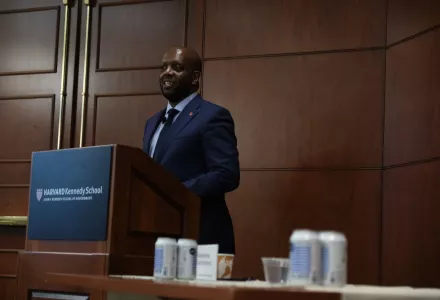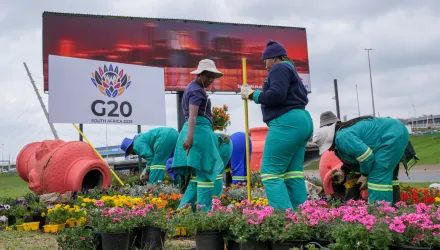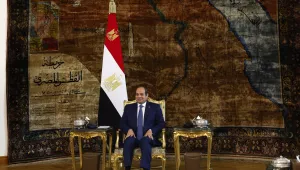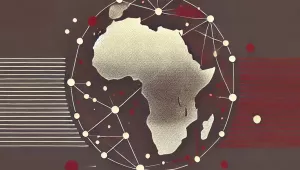
Speech Delivered by His Excellency Dr. Martin Kimani
Permanent Representative of Kenya to the United Nations
Harvard Kennedy School
April 26, 2022
Thank you to the Harvard Kennedy School Africa Caucus and the Belfer Center for the opportunity to deliberate with you today. Thank you Thomas Kisimbi for the kind introduction, and your generosity in taking your valuable time to shaping this event and my time at Harvard.
I must caution this wonderfully learned audience that I will be speaking in my personal capacity, not communicating Kenyan policy. It is sometimes useful to step back and consider matters from a broader, more historical perspective before plunging back into the trees where the work takes place.
I am glad to do so here at Harvard before these talented younger and mid-career students who are figuring out how to connect their personal missions to the many institutional opportunities available to them.
Today I will speak about the African story and its importance, not only to how it guides our diplomatic engagement but its meaning to your own practice.
I will propose that we are well advised to better understand how our individual and institutional efforts, whether we are diplomats, students at Harvard, or businesspeople, fit within the oldest and most diverse story ever lived.
On the 21st of February, during an emergency seating of the UN Security Council called following the recognition by the Russian Federation of two breakaway regions in Eastern Ukraine, on behalf of the Kenyan delegation, I told a 4-minute story of Africa’s response to retreating European colonial empires.
By then, Kenya had been a non-permanent member of the Security Council for a little over a year. We had made hundreds of statements. Every one of them about a political crisis leading to extensive violence with significant fatalities and ensuing humanitarian emergencies.
Whether we were commenting about conflict situations in the Balkans, Yemen, Myanmar, or the multiple conflict situations in Africa, our practice as a delegation has been to identify solutions that reflect African positions and interests.
We assume that African peoples, as expressed by the official positions of the African Union, regional blocs and states, have irreducible interests in global governance that we must advance.
In the twists, turns and pressures of life in the Security Council, we have often needed to take positions that emerge from our Pan-Africanist reading of a situation.
By this I mean acting according to the call for unity in action among Africans, and the need for resistance to any form of geopolitical control or manipulation contrary to the security and wellbeing of our people.
That evening, and during every meeting that has followed on the war in Ukraine, the African three on the Council have called for respect to be shown by all powers for the self determination, territorial integrity, sovereignty and political independence of states.
For this reason, anticipating the threat of war that now loomed ever more darkly, Kenya, Gabon and Ghana all strongly criticised Russia’s recognition of the breakaway regions in Eastern Ukraine.
The military operation that followed was not, and is still not defensible, in relation to the bedrock principles it has violated. But, seen from the perspective of the story told by the Russian Federation and its sense of being existentially threatened by the West, it could be understood even if not endorsed.
That is the point of the stories we tell that allow us to make sense of our world. We heard both Russia and Ukraine tell their stories, which stretch back for many generations. So powerfully opposed are these stories that their clash is taking place with tanks and bombs. That is the power of story to make or destroy.
Every other delegation on the Council that evening also told a story responding to this singularly dangerous moment. They ranged from the defensive, to the transactional, to strong condemnations even by members who had themselves repeatedly breached the very same principles.
If you go back to each one of those statements, you will see clearly that they all emerged from very specific histories being used to interpret a common set of facts. We ended up in different positions, and there we have stayed until this hour, unable to find the wherewithal to fulfil our mandate to protect international peace and security.
Gabon, Ghana and Kenya mounted a robust defence of a global order that in many ways has not been as protective of our sovereignty and objectives as Africans.
I believe we did so because the alternative to the principles of self determination, territorial integrity, sovereignty and political independence being adhered to are too awful to contemplate. They were also the cornerstones of our fight against colonialism and the key to sustaining our future freedom from external control. And also because long before they were articulated in the UN Charter, these principles were deeply embedded into our African stories.
My key argument today does not regard the tragedy of Ukraine or the dozens of other conflict situations being considered by the Security Council. It is about the radical impact to our actions that emerges from how we tell and think of the African story.
Ladies and Gentlemen,
The shorter the history you consider important, the shorter your future horizons. The more minor and negligible your efforts. The more deeply demoralised and demotivated you are.
I have seen a number of political histories of Africa that begin our story at independence from colonial rule by the French, British and the Portuguese. Others begin in the Berlin conference and describe in minute detail the depredations of colonialism.
Then there are those that lay out the horrors of the Transatlantic and Indian Ocean slave trades. They are all important, but our story is far more than the oppressions we have suffered at the hands of outsiders.
Each of these historical accounts locate the brutal power of the slaver and the colonialist at the centre of our world.
They very often lead to comparisons of how African countries have performed as compared to the wealthiest states. Six decades into our journey as independent modern nation states, the verdict is mostly damning. We are judged, and, far worse, judge ourselves, as failures.
From this a perverse, damaging, and even crippling, story of helplessness emerges. It saps the hope and optimism that we need, makes us prey to predatory states and businesses, and on a personal level leads to the cynical attitudes that are the first stage in the journey to corruption and criminality. The limits of the historical timeline, and its psychological impact, make the future hazy: barely can we conceive of our efforts in generational terms.
As a boy growing up I loved science fiction. It became apparent at some point however that man’s leap to the stars did not include Africans! This is why I recommend I will always recommend that you pick up Octavia Butler’s novels and the increasing number of science fiction by writers of African descent.
To be an intentional ancestor on whose efforts future generations will build on, you have to be able to see that they are coming and to plant the seed that will be the tree they shelter under.
In the fullness of time, the decades since independence, the brutal absurdity of Berlin and the centuries of slave raids, will be but a small fraction. If we tell and live a fuller history, our descendants will come to regard our present condition as a slightly surreal and difficult to believe history. This day is coming, one way or another.
It is left to us to determine how soon it will arrive. We can hasten its arrival by choosing, very deliberately, to locate our efforts in a different timeline than we are accustomed to.
Ladies and Gentlemen,
The African story is many stories told by many millions. It is diverse experience, millions of acts of multi-generational collaboration and future-making. It is driven along by the invention of the world’s most diverse social and cultural technologies embedded in language, tradition and ritual.
Africa has by far the richest genetic and cultural diversity in the world. The latter means that we have by far invented the most hacks into the sheer challenge of survival and prospering. Our many cultures are filled with invention and responsiveness, and flexibility, as they carry generation after generation across a gulf of time.
My own people, the Gikuyu, were inventors of detailed processes of developing upstanding citizens in a rigorous process of education, tests and mentorship. Reason was a high aspiration that lived in a welcome tension with spiritual and religious practices built into everyday life. Freedom of speech and thought were inviolable. Tyranny was resisted and the cultural frameworks to resist it were inserted so deeply that language was built to embed them in our minds. Honesty, hard work, and wise civic speech were praised and the young offered paths to achieve them.
Earlier today I met Professor Caroline Elkins who has written of the brutal colonial response to our insistence on our freedom and independence. Long before Britain’s gulags and concentration camps in Kenya she writes about, the colonial regime deliberately and insidiously attacked our cultural foundations.
But far far worse than their worst efforts, we largely abandoned our own cultural technologies. The world monotheistic religions that came with missionaries and Imams inspired us to cast our own monotheism and polytheisms into the rubbish bin. The baby was thrown out with the bath water and what remained was cast as inferior, and not a vehicle in which to effectively manoeuvre in the 20th and 21st centuries.
We abandoned the world’s greatest cultural treasures, a wealth that knows few equals. It stretches from the great cities of Africa that are as old as any mankind can boast of. The splendid Benin Bronzes. The fractal mathematics that underlay how many homesteads, villages and towns were laid out. Great Zimbabwe. The Swahili city states. The sophisticated diplomacy of the Kongo Kingdom. Ndzundza house painting and street lights in Mansa Musa’s Timbuktu with its ancient libraries and cultures of learning. The astronomical inquires of the Dogon philosophers and mathematicians. The military strategy of the Zulu empire.
There is not enough time today to list the immense accomplishments in our past. But, let me be clear, it is not enough to boast of past greatness. Far more important than the objects we made are the ideas and ideals they represented.
Across the continent, the value of the human was deeply linked to belonging to the whole. Story-telling was written into every facet of our cultural lives.
I recall observing a peace negotiation in Southern Ethiopia between groups that had clashed over water and pasture. They started the mediation by telling their stories of how they came to be, the past treaties they had agreed with one another, and the previous crises they had overcome on the basis of negotiation.
I propose to you today that our work must be located in this longer-standing, deeper, and more diverse African story. It is a story large enough to contain the million stories we are each telling, so that they are carried in a great travelling caravan linking our past with a distant, promising future.
You will by now be asking how any of this is practical. For a delegation in the Security Council, locating our diplomacy in this story has an electrifying effect. It means reaching out for collaboration with the African peoples in the Caribbean. It means the Kenya delegation has used its platform to reach out in solidarity with the people of Haiti and Afro-Colombian communities.
It has allowed us to interpret the Sixth Region in the Constitutive Act of the African Union as a political bridge to African peoples in every corner of the world. For the Kenya delegation, the Sahelian citizen on a raft headed to Europe and the African American who experiences police brutality, are our concern. Their security and wellbeing concern us, and impel us to act in their stead in the debates at the United Nations.
To the talented young people in our delegation, and in this audience, who want to take action to reduce climate change. Locating such action within the wider sweep of our story is to act as the descendants of peoples with a protective and spiritual attitude to nature. They will understand from this that conservation and sustainability are written into the very languages our parents taught us. They will come to the debate not as the assistants or objects of foreign conservation but as longstanding champions of these efforts.
They will also insist that global climate action cannot be undertaken, as is now the growing tendency, at the expense of our economic betterment.
For those of you who are interested in education, our story opens up revolutionary paths. You will look into the cultural toolkits in your countries to discover in them valuable innovations that can open new vistas to students.
I had an opportunity to speak on this subject to the documentary filmmakers at Docubox in Nairobi. They were all telling different and valuable stories. I encouraged them to locate their films within this broader sweep, as they saw fit, knowing that its powerful echoes and connections would have a level of impact.
Rarely has Africa so desperately needed its storytellers to match the rare skills of the griot as it is does now as our people groan under a limiting, often racist, and demoralising story of themselves.
I want to finish by coming back to those core principles of African unity self determination, territorial integrity and sovereignty. They are pillars of our stories because we are witness to the atrocity and suffering that has befallen us when they were violently and insidiously assaulted by slavers and colonialists.
We need to fit our diverse efforts and experiences to this bigger African story because it will allow us to shape a new mental, political and economic operating system for ourselves and our communities.
If we occupy it, and tell it, and deepen its articulation, it will be the clearest and most welcoming framework for respectful collaboration with the world.



